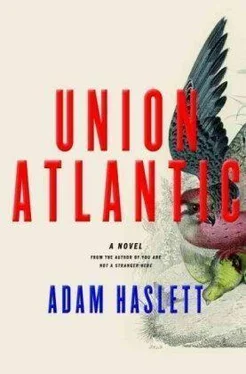It hadn’t been as Henry and her mother imagined. Eric never stole anything. He never put her in harm’s way. They didn’t stop loving each other. The whole thing was so far outside her experience, at first she didn’t know what to do. She asked him if he would please stop, and he said that he’d try. Which he did for a time, though it might have only been weeks. She remembered coming back from the library one late afternoon and finding him asleep on the couch, his sleeve rolled up, a dot of red where he’d punctured the skin. With a cotton ball dipped in rubbing alcohol she daubed at the pinprick and covered it with a Band-Aid, then tidied the house and sat at her desk to type up her reading notes, because what else was she supposed to do, still wanting him as she did? When he woke, he rolled down his sleeve without saying anything, walked around behind her as she worked, and hugged her back to his chest. She heated up fish cakes and a can of baked beans, just as her mother used to on Fridays when the cook was off, and they sat at the little table by the back window and she cried a bit, but he told her it was only to help him get through the next while, the pressure of the work.
“You’re the only one I don’t feel lonely around,” he said, holding her hand.
“Can’t that be enough?”
“It will be.”
She knew nothing about the course of such things. Why should she? When he asked for money, she gave him what she could. He’s got the flu, she said to her mother in the kitchen at Christmas back in Rye, where at the dining-room table beside Henry and Betsy and her cousins it was suddenly obvious how sickly he appeared — her mother, who ever since Charlotte had met Eric had been torn between her desire for a wedding and her wish that Eric had come from a slightly better family, or at least a Protestant one. And of course the age difference ran in the wrong direction. She had married Charlotte’s father at twenty-one in the church on Copley Square and following her own mother’s example treated her husband as a kind of necessary appendage to the larger body of her household, the grand purpose of which was the flawless production of her children. A purpose Charlotte had years ago begun to thwart, failing to hide her disdain for that whole rigid, sequestered, matriarchal prerogative. If there were anyone in the family she could have confided in about Eric, it would have been her father, who’d admired the way she’d gone off on her own, but still it would have meant the end of things, his comforting her but still intervening to protect his daughter.
In January, Eric stopped going to his classes, stopped reading much at all, and only left the house toward dusk, coming back an hour or so later to spend a little while in the bathroom before napping. In bed, she’d hold him close, her hands reaching up to pat his damp hair. Usually by then, at midnight or one, he returned to a kind of equilibrium, and with the lights out and the building quiet, they talked as they had at the beginning, Charlotte recounting a novel she’d read or thinking aloud about the line of argument in whatever paper she was writing at the time, Eric asking her questions and listening, assuring her that, yes, he wanted to know. She remembered now the night she got up her courage to ask him what it was like to have that liquid in his veins. He said it felt like being able to live inside a memory of a childhood he was certain he’d never had, as if all the world around you had become the setting of a rich, nostalgic dream, some invincible summer. She could tell he was partly in love with the romance of it, the affective correlative it gave to the intellectual conviction about our lost experience of being, as if he were the living experiment for the things he studied and would one day turn it off and write it all down. Naïve, no doubt. But being with him made Charlotte realize how on her own she’d grown grimly practical, a student of what was required for praise and advancement. The pleasure he gave made her forget all that. Yes, he was deluding himself, mistaking a simple thing like taking drugs for the complexity of figuring out how to live, but the very youthfulness of the error opened something in her, a nostalgia of her own for romances she’d never had.
“He didn’t use me, Wilkie,” she said. “You’re wrong about that. I did what I thought was best.”
At the beginning of spring, Eric told her he’d been to a doctor and was tapering off. This was why he felt so sick, he said. Some days he barely left the bed. She ran baths and washed him just as he had washed her those first weeks after they made love. It was on a Friday afternoon that whatever supply he’d managed to build up ran out. To go off too quickly was dangerous, he said.
She hesitated at first. They could stay together there in the apartment and see it through, call the doctor if necessary. But he looked awful, his skin green, his eyes sunken. It was just a short walk through Washington Square Park to a building down on MacDougal Street. Four flights up past the old Italian ladies chatting on the landings. Seven or eight kids, in their twenties most of them, crowded into a little apartment, the shades pulled over open windows, everyone smoking, shouts from the street and the sound of motor engines bouncing off the building opposite into the dank, carpetless living room. The boys wore wing tips like her father’s. Wing tips and turtlenecks, the girls in corduroy pants and oversize sweaters. They stared at her as she imagined they would at their mothers. Someone was writing up a flyer. There were meetings she should attend. “In the kitchen,” someone told her, guessing her purpose for being there. A man with a lazy eye, who spoke with a slight Canadian accent, was the one she gave the money to and received in return a small envelope. Walking back up lower Fifth Avenue, Charlotte noticed the couples hand in hand, emerging from the brightly lit lobbies of the fancy buildings, headed out to dinner, the Henrys and Betsys, who when they glanced at her saw one of their own, her anxious mind calculating the efficacy of her disguise, wondering if they could ever guess her errand.
To her surprise, Eric had made the bed while she was gone, and tidied the kitchen as well. He’d cleared his books off the table and stacked them by the door.
“You’ll take less?” she asked, and he nodded.
Despite the sickness, he looked younger than when she’d met him, his features somehow more open, no longer organized by inquisitive zeal. Again, she offered to phone the doctor. He had never been to one, of course, so there wouldn’t have been a number to call. Instead, she put the envelope down on the counter and went into the front room. One thing she couldn’t do was watch him at it. Still in her coat, she sat by the window, looking through the bars of the windows at the passersby.
Once the summer came, she thought, they would go up to Massachusetts and use the Finden house for a few weeks when her parents weren’t there. They’d take the Jeep to the lake and on the way back buy corn and fruit at the farm stand. Come fall, Eric would get back to his classes, she would finish her thesis. They might get married in a year. She would meet his brothers and sisters. His parents would come around, eventually.
The Day was a public Thanksgiving for the Mercies of Heaven in the Year that is past , Sam intoned. I laid aside the subject I intended and in the Morning I composed a sermon on the line in 1 Samuel. She wept, and she did not eat. A sermon on the Thanks offering, prosecuting that Observation, that a sense of Affliction was oftentimes a Hindrance to the work of Thanksgiving, but that it ought not to be so. My son died about Noon. My sermon in the Afternoon proved very acceptable, and reasonable, and serviceable .
Читать дальше












